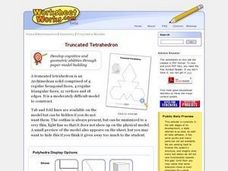Curated OER
Silica Tetrahedron Model
Very simply, pairs of learners construct a model of the tetrahedral silica structure using raisins and toothpicks. They dip it into a soapy solution and then blow a bubble "atom" into its center. The lesson plan gives instructions that...
Curated OER
Countdown Challenge: Platonic Solids - Part I
Use a Platonic solids worksheet to record the number of faces, edges, and vertices of five polyhedra whose faces, edges, and vertices are all identical. For each figure, learners write a proof of Euler's formula (F+V=E+2). They create a...
Curated OER
Revise Identifying 3-D Shapes
For this 3-D shapes worksheet, students practice identifying 8 3-D shapes with their following precise names: cube, cuboid, square based pyramid, cone, cylinder, tetrahedron, octagonal prism and hexagonal prism.
Curated OER
Truncated Tetrahedron
In this math worksheet, middle schoolers read about the truncated tetrahedron and then create a paper model. It should look like a solid comprised of 4 regular hexagonal faces, 4 regular triangular. faces, 12 vertices and 18 edges.
Curated OER
Tetrahedron
In this math worksheet, students construct a paper model of a tetrahedron. They create it to have four triangle faces, four vertices and six edges.
Curated OER
Investigating Nets and Polyhedra
Fifth graders create a net for a given polyhedron. They determine the corresponding polyhedron for a given net. Students investigate several polyhedra (cube, tetrahedron, and one of their choosing) and their corresponding nets. They...
Curated OER
Crystal Structure Lab
Students study and examine crystal shape. They create the two basic unit cells (one a tetrahedron) out of pipe cleaners and dip them into soapy water to see if they can form bubbles to represent a silicon atom in the center of a...
Curated OER
Volume Of Tetrahedron With Congruent Faces
Ninth graders investigate the concept of a tetrahedron and how it is formed with its congruent faces. They practice making the shape by practicing the folding paper to create the shape. Students continue the lesson with the estimation...









